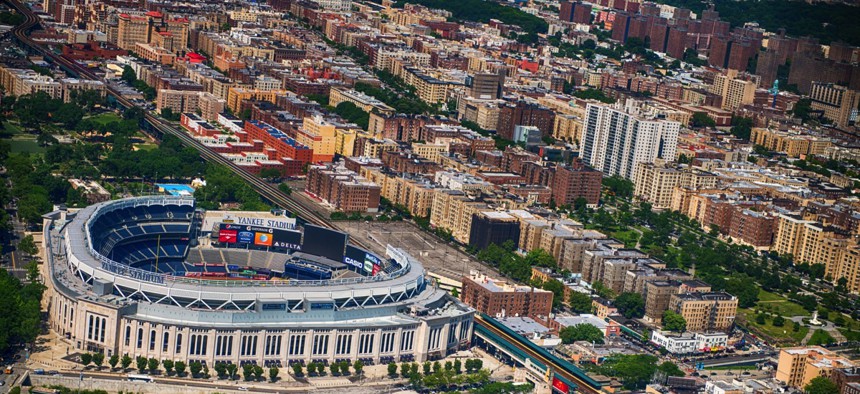Accelerating Internet Accessibility in U.S. Cities

The Bronx, New York City

Connecting state and local government leaders
EveryoneOn has already brought affordable, reliable internet to 405,000 homes in 48 states, and the nonprofit is about to embark on a nine-month effort to expand its work.
New York City partnered with T-Mobile in December to provide 5,000 Bronx families in public housing with free tablets and discounted internet in 2017. But the deal wouldn’t have materialized without the help of a small startup set to be scaled up by the Future Cities Accelerator.
Washington, D.C.-based nonprofit EveryoneOn, and nine other early-stage organizations tackling challenges faced by poor or vulnerable urban populations, on Wednesday won $100,000 each and nine months of support from the accelerator.
EveryoneOn’s goal is to connect 1 million people in America to affordable, reliable internet by 2020 brokering deals between big and small ISPs, tech companies and state and local governments like it did in the Bronx.
“New York City was looking to connect a large amount of families to internet service, but geographically it was tough to figure out which ISP could step up and provide that service,” Chike Aguh, EveryoneOn CEO, told Route Fifty in a phone interview. “Because of our national work, we knew T-Mobile had the footprint and products needed, so we introduced them to the Mayor’s Office and relevant personnel.”
The effort was part of the Obama administration’s ConnectHome initiative, in which the U.S. Department of Housing and Urban Development assisted 20 cities across the country, and negotiations lasted a month.
Since its founding in 2012, EveryoneOn has connected 405,000 people in 48 states—employing online marketplaces and regional managers to answer families’ questions and sign them up for internet offers and training.
Currently more than 60 million Americans, 20 percent of the population, lack internet access and most are people of color, Aguh said. With 90 percent of job and college applications online, the digital divide puts them at a severe disadvantage. A person with internet obtains employment seven weeks faster than a person without it—earning an additional $5,000 a year.
The nonprofit’s commitment to ending the inequality and giving people greater economic and social control of their lives was a major selling point for the Future Cities Accelerator, which looks to scale organizations capable of making a “deep and lasting impact.”
“Ordering large orders through economies of scale allows for cheaper internet rates, $9.99 a month on average,” Teju Ravilochan, the CEO of Unreasonable Institute, said in an interview. “That’s basic infrastructure that every person in our country should have access to, to get jobs and an education.”
The Boulder, Colorado-based parent accelerator and The Rockefeller Foundation announced the latest Future Cities cohort on Aug. 12 and whittled 314 completed applications down to 70 candidates, then 40 after interviews, then 10 diverse winners after in-person visits with teams, boards, funders and beneficiaries.
Coachable teams with relevant expertise were sought to be mentored, and EveryoneOn has built up experience working with governors, county boards, city councils and mayors.
“Mayors see the benefits [of our work] on a regular basis because constituents come to them when their kids can’t do homework or they can’t access a job site or create a resume,” Aguh said. “It’s very visceral for them.”
That’s why EveryoneOn is making mayors’ offices a focal point of their work and “digital equity champions” strategy moving forward. Mayors know all the players in their cities and can be conveners around the issue of internet accessibility, Aguh said.
Aguh hopes the design principles the Future Cities Accelerator imparts over the next nine months will help EveryoneOn develop the digital equity champions concept.
“This is an extension of the work we already do in cities,” said Josh Murphy, Rockefeller Foundation associate director. “We also need to think about how we work in other communities like rural communities.”
Following Wednesday’s winners announcement, Unreasonable will set to work identifying each organization’s core needs and ideal mentors. Products will be prototyped over six weeks with a five-day boot camp in March, after which the $100,000 will be granted.
Financial modelers and fundraising and leadership coaches will be brought in before a large funder event in October for networking. At the conclusion of the nine months, revenue and leadership growth will be measured.
Much like 1990s get-out-the-vote efforts that tried to register voters when they went to the Department of Motor Vehicles, EveryoneOn envisions taking advantage of common interaction points like registering for school lunch benefits to get people online.
“To have an organization willing to make an investment in your work is really important,” Aguh said. “And to have someone from Google teaching their design approach, that is a once-in-a-lifetime opportunity we can use to help a bunch of people around the country who need it.”
The complete list of winning ventures can be found here.
Dave Nyczepir is a News Editor at Government Executive’s Route Fifty and is based in Washington D.C.

NEXT STORY: Virginia Lawmaker Wants Answers on Whether D.C.'s Metro System Is Ready for a Cyberattack





